He Quit a Rs 1.5 Cr Job at 23 — Now This 25-YO Runs a Sustainable Farm in Manali
When I first spoke to Abhishek Reddy over the phone, it was early morning in Manali. His voice was calm, measured, carrying the gentle lilt of someone who has found a serene corner in the world. “I have always chased peace,” he tells me, “and that has made me rebuild my life more than once.” That line lingers long after we hang up, the idea of peace not as a vague aspiration but as a force strong enough to compel someone to walk away from a lavish career and start afresh.
From the forested valleys of Himachal Pradesh, where he now lives, his story spins out like a river meandering through glens of hope, hardship, and heart. Not so long ago, he was earning Rs 1.5 crore a year as creative director at a booming Hyderabad start‑up, an achievement many only dream of in their twenties. Yet, despite the financial freedom and professional acclaim, he says the career felt “hollow, like a gilded cage without room to breathe.”
Today, perched in these mountains, he is planning another farm. It will not be a replica of his previous endeavour; it will be a fresh start, grounded in everything he learnt, yet seeking something richer — namely, community and belonging.
The grounded beginnings of a dream
His journey began not in these cool heights but in the scorching heat of Andhra Pradesh, on a five‑acre stretch of red clay that he painstakingly turned into a permaculture sanctuary. That land was never just soil and seed, it was a dream, a refuge, and ultimately, a teacher who showed him the cost of chasing peace alone.
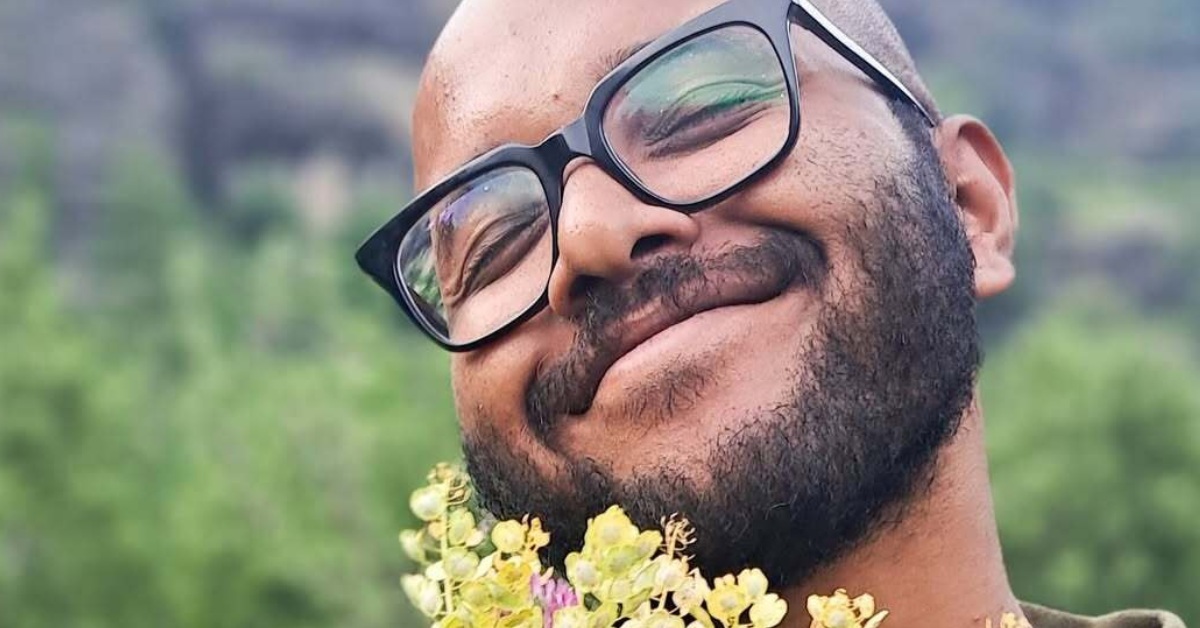 Abhishek Reddy left his high-paying job at a startup because he was working for 15-16 hours, and that led to a complete burnout
Abhishek Reddy left his high-paying job at a startup because he was working for 15-16 hours, and that led to a complete burnout
Before the pine‑scented mornings of Manali, before the first furrow split the earth, there was the urgency of the city. “I started working when I was still in school,” the 25-year-old recalls. “By Class 12, I was making Rs 30,000 a month freelancing in graphic design and copywriting. College was not a part of the plan as I was already building a career,” he tells The Better India.
He laughs at the memory of those teenage years, single‑handedly picking up skills like design, animation, and marketing, until he resembled “a one‑man agency,” juggling multiple roles. That hustle propelled him to a creative director post by the age of 21, with a salary few could fathom.
“It was crazy,” he admits. “Everyone thought I had it all.” But as he recounts the unrelenting 15 to 16‑hour days, the nights without sleep, the constant rush to meet deadlines, you begin to sense the cost of that very success. “I remember working through New Year’s Eve alone in the office. My boss told me to take a break, and I said, ‘I’ll rest when it is all done.’ But that finish line kept moving. It was always just out of reach,” he explains.
The crash that changed everything
And then, of course, came the crash. “In 2023, I hit a wall,” he says, voice steady but reflective. “Burnout is not just being tired. It is like breaking from the inside. I quit abruptly, with no plan, and just left everything behind because I could not take it anymore.”
For half a year, he wandered through a haze of uncertainty. “I did not know who I was outside of work. For so long, money and status had defined me,” he admits. That was when his mother reminded him of the farmland he had bought years earlier near Pamidi in Anantapur, a tract of red earth with a dry well. “‘You always wanted to retire on a farm,’ she said. ‘Why not start now?’ That question stayed with me. It felt like a call to myself,” says the 25-year-old.
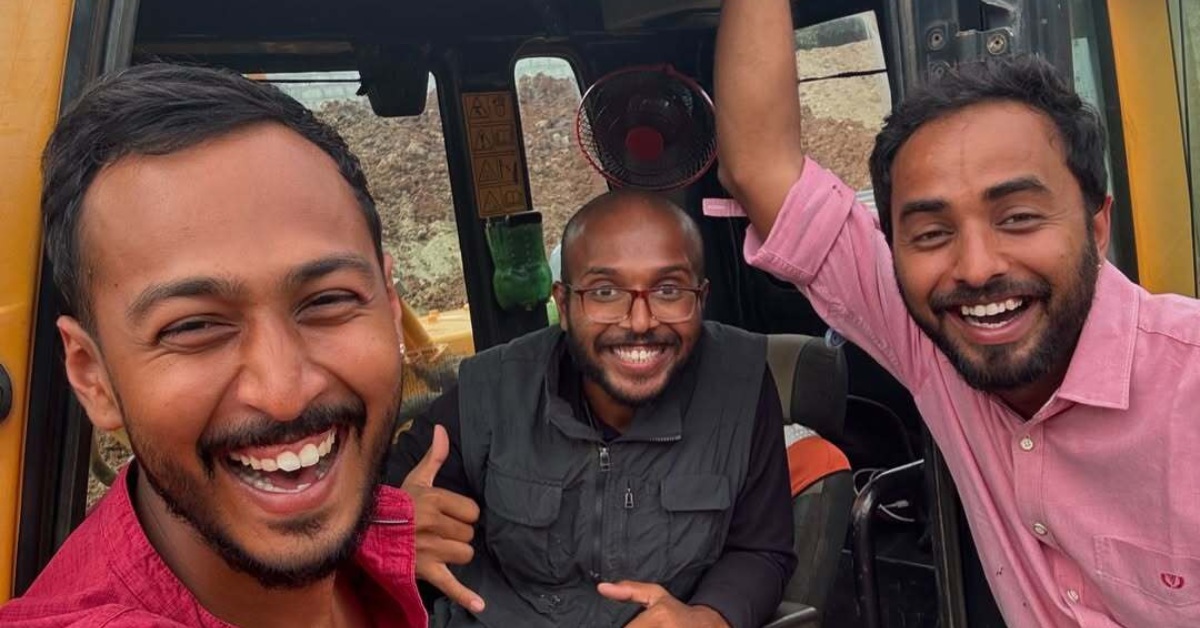 Abhishek started to experiment with permaculture once he moved to his farm near Pamidi in Anantapur
Abhishek started to experiment with permaculture once he moved to his farm near Pamidi in Anantapur
Arriving at the farm was both relief and reckoning. He remembers the parched soil, the dry well, and the overgrown stream bed. “It was not a lush paradise. But I did not want a traditional farm either, so this worked out for me. I wanted a food forest, a place where every plant supports another, water is conserved, and the land heals itself,” Abhishek explains.
He immersed himself in permaculture principles, learning to layer the landscape with tall canopy trees, like mangoes, guava, jackfruit, mid‑level nitrogen fixers such as moringa, which he calls a “miracle tree,” because it grows fast, enriches soil, and feeds soil and people alike. It also had low‑lying ground covers like sweet potato, sweet peas, butterfly pea, and brahmi to hold moisture and guard against erosion.
Water remained the fiercest challenge for the young boy, trying to build a life on a farm in the Obulapuram village near Pamidi. The well had dried up, and the stream flowed only in the monsoon. So he and his mother, Neela Reddy, dug swales, trenches carved along the contours of the land to catch and hold rainwater.
“It was gruelling work, in the midday sun,” he recalls, pausing. “But after the first monsoon, the soil drank deeply and the land greened.” They installed drip irrigation for efficiency, and later added sprinklers for areas with dense ground cover.
He introduced chickens to scratch the soil and fertilise it, later brought in bees to aid with pollination, and added compost worms to speed up the breakdown of organic waste into nutrient-rich soil.
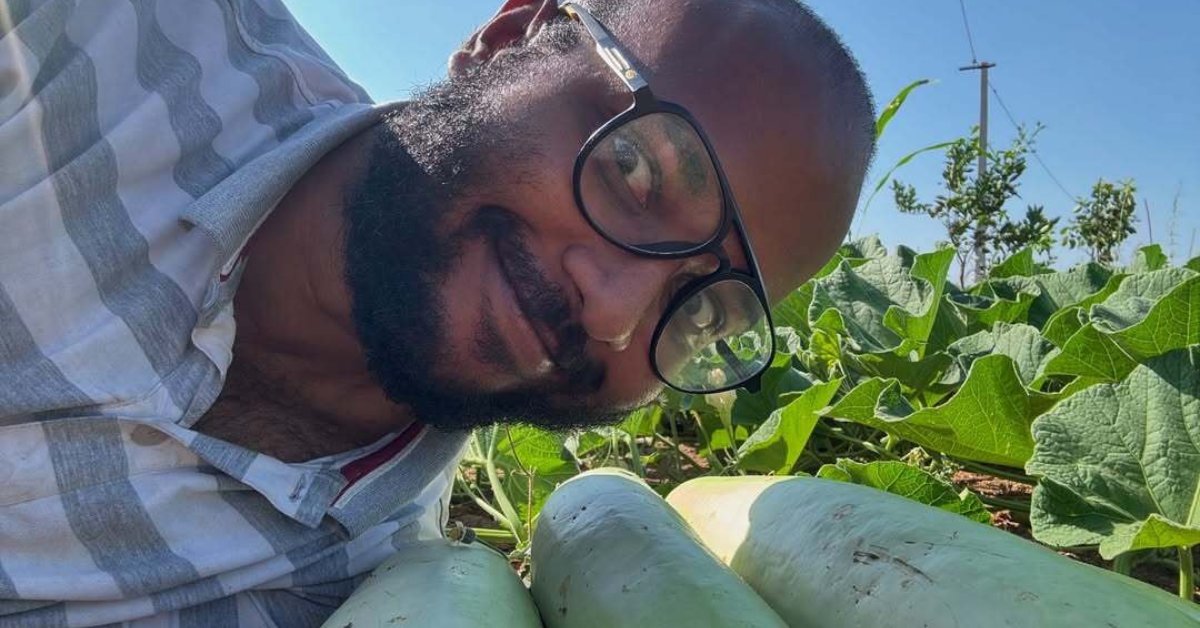 Abhishek grew all kinds of crops in his farm in a systematic way so that the plants could support each other
Abhishek grew all kinds of crops in his farm in a systematic way so that the plants could support each other
Seeds of doubt, roots of hope
His extended family, who had lived there for generations, and neighbouring farmers who had worked the land for years, regarded him with mild suspicion. “They thought I had lost my mind; just some city boy thinking he could farm the desert,” he says.
However, every new sprout, every budding flower, every stabilised trench, slowly turned suspicion into wonder. That first harvest, including tomatoes, bottle gourd, ladyfinger, bitter gourd, and leafy greens, was modest, yet hard-won.
“There was an overwhelming satisfaction in eating something I had grown with my own hands,” he says. His once-barren plot grew more than 35 different crops, which is living proof of the power of learning and experimenting.
In order to share both the triumphs and tribulations of this farming life, he created an Instagram account called ‘Silly Sensei’. “I wanted to show the real stuff, something that textbooks and traditional farmers were not teaching to the ones who are interested in knowing about this life,” he says. His candid posts struck a chord and drew more than 700,000 followers. “People like that, I am so enthusiastic to teach them about farming and how we can live a healthy life,” he says.
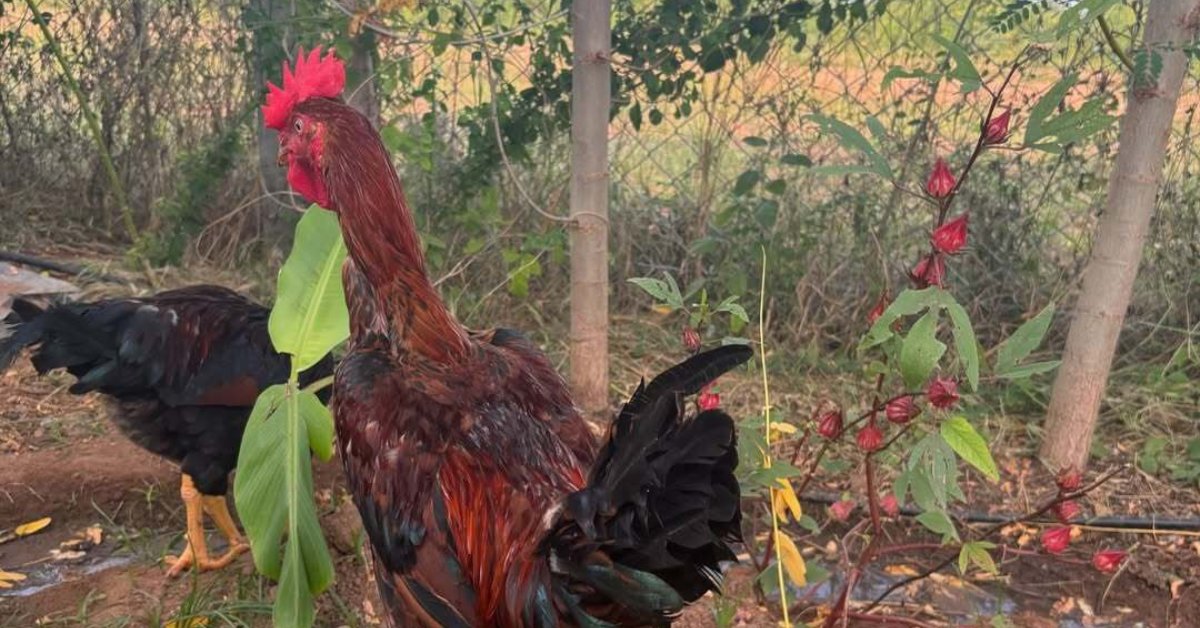 He also introduced chickens to the farm to scratch the soil and fertilise it
He also introduced chickens to the farm to scratch the soil and fertilise it
This online following brought two friends to the farm. One was Ponni M Nath, an artist from Kerala. “Visiting Abhishek’s farm was like stepping into a lovingly crafted oasis,” she recalls. “He approaches farming as an art form, blending intuition with science. I spent the day learning about permaculture principles, how every plant, every section of the land, is part of a carefully balanced ecosystem. He walked slowly among the crops, adjusting branches with care and even talking to the plants, as if each one had its own story to tell. And the meal he prepared for me, made entirely from produce grown on the farm, was the freshest and most delicious I have ever tasted,” she says.
Then there was another 38-year-old friend, Rency, a novice in agriculture, who describes his experience on the farm with admiration. “Abhishek taught me that every plant is part of a web,” he explains. “He was growing food and shaping an entire ecosystem.”
He continues, “I am an adventurer and an entrepreneur living in Manali. For some business meetings, I visited Hyderabad and met Abhishek, an old friend I affectionately call ‘Silly’. When he started building his life on the farm, he invited me over. It was a wonderful experience, something I had always wanted, to visit a farm and see how it works.”
A farm that teaches
Rency recalls being struck by Abhishek’s methodical and scientific approach. “I have always known him as systematic and business-oriented, but what I saw on the farm was farming done in a completely scientific way. It is very different from traditional methods and far better for the trees, the environment, and the food itself,” he says.
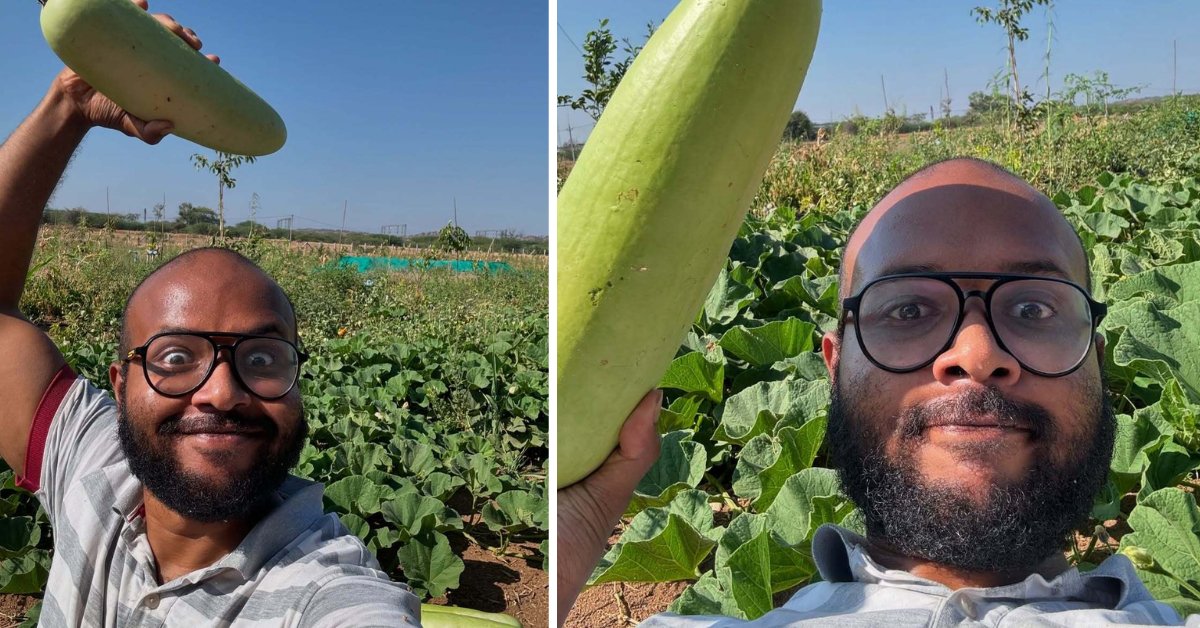 Abhishek says permaculture is very different from traditional methods and far better for the trees, the environment, and the food itself
Abhishek says permaculture is very different from traditional methods and far better for the trees, the environment, and the food itself
Despite having no farming background, Rency was captivated by his friend’s enthusiasm. “He was so excited to take me around and explain everything, the why and how of it all. He told me why the vegetables grow the way they do and the reasoning behind planting patterns. I saw an area covered with certain plants that fix nitrogen, supporting the mango trees nearby. The vegetable garden was flourishing with a dazzling variety,” he explains.
He was fascinated by the organic and sustainable system his friend had built. “It was incredible to witness the environment working in harmony. Anantapur is known for its water scarcity, but Abhishek’s farm had enough water. That is because of his rainwater harvesting system and careful design,” he says.
Rency continues, “Seeing what he has achieved at such a young age made a huge impression on me. Now, living peacefully in the mountains of Manali, I find myself motivated by his journey to build a life in tune with nature, just as he has.”
Financially, the farm did generate some returns, about Rs 25,000 a month from half an acre of vegetables sold in nearby markets. But Abhishek explains that he never set out to become wealthy. “It was never about the money,” he says. “It was about building something that felt meaningful.”
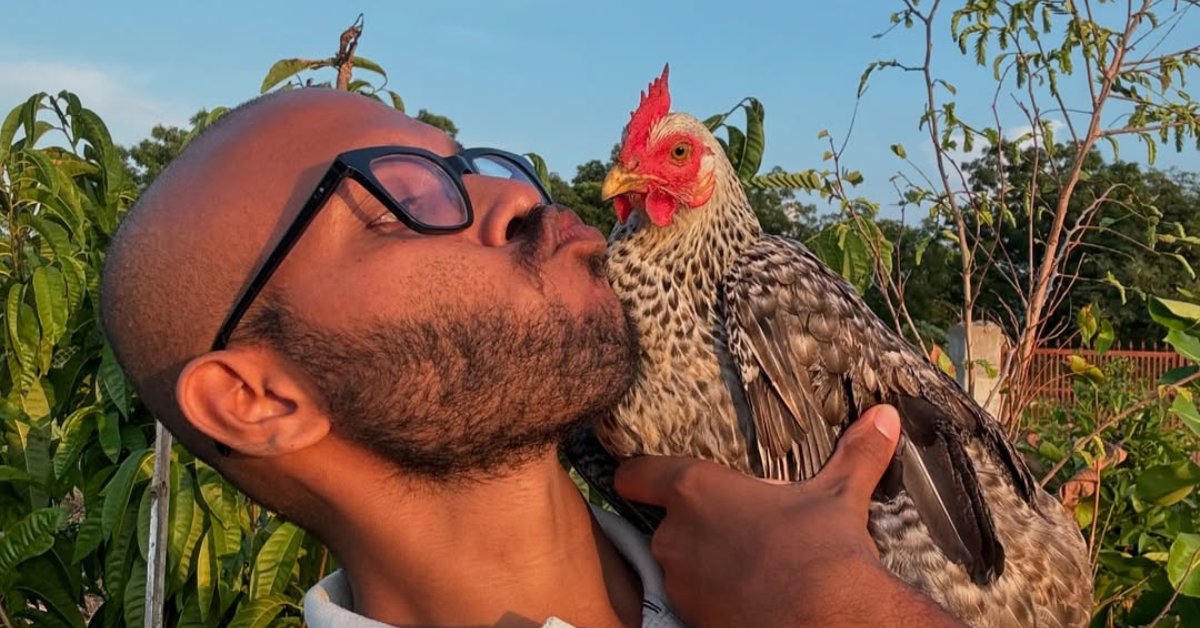 All of Abhishek’s friends who had visited the farm were amazed by the way he grew his own food
All of Abhishek’s friends who had visited the farm were amazed by the way he grew his own food
But the slow pace of agrarian economics, the challenges of marketing, distribution, community engagement, and labour coordination weighed heavily. Farming demanded constant presence, and profits were slow to arrive.
More than anything, he came to understand that peace requires more than fertile soil and steady yields. “I longed for connection,” he admits. “I wanted people to walk beside me, and not just visit.” It was a painful paradox as he had fashioned a sanctuary, but lived in solitude.
When letting go becomes the brave choice
Leaving the farm two months back was one of the hardest choices he ever made. “I felt I was tearing up a dream I had built from the ground. But sometimes, holding on hurts more than letting go,” he says, voice momentarily breaking. The decision to leave was one of both surrender and salvation.
In Manali, he has finally found space to pause and reflect. Surrounded by the stillness of the mountains, he has begun to consider where and how he might farm next, this time, with greater clarity and intention. “Now that I have had the experience, I feel I can do it better, choose a place more suited to a farming life, take my time, and build it the right way,” he says. Here, in the calm of the hills, he is not rushing forward, but thinking about what comes next.
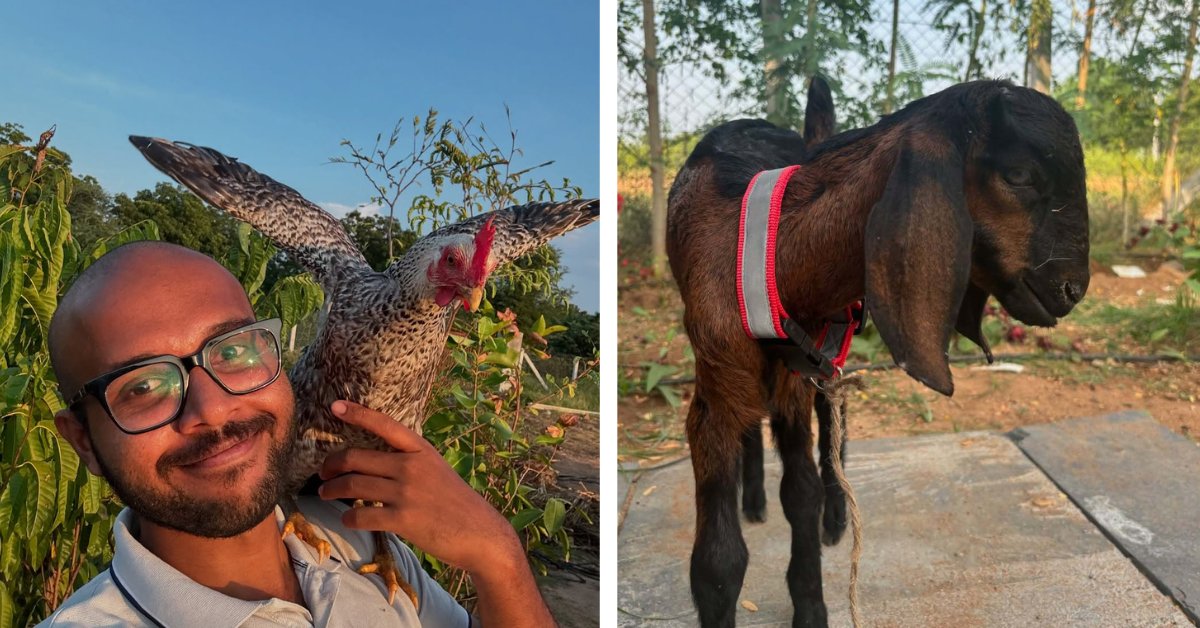 Abhishek wishes to return to his farming life soon, and this time he wants to choose a suitable land that supports permaculture
Abhishek wishes to return to his farming life soon, and this time he wants to choose a suitable land that supports permaculture
His passion for the land has not diminished. “I am looking for a smaller plot this time, not isolated, but in a community that works together,” he explains. As we end the call, Abhishek says with a soft conviction, “I still hustle, but now it is for peace, not proof. I stay only where I feel I belong.”
This young man’s journey reminds us that success is not a single route to wealth or acclaim, but a twisting path that sometimes requires letting go of what we built in order to find what we truly need. And that peace, like a farm, must be sown with patience, nurtured with care, and shared with others. “Do not fear rebuilding your life, even if it means leaving behind everything you thought you wanted,” he says. “Sometimes, peace is the greatest harvest.”
All pictures courtesy Abhishek Reddy
News